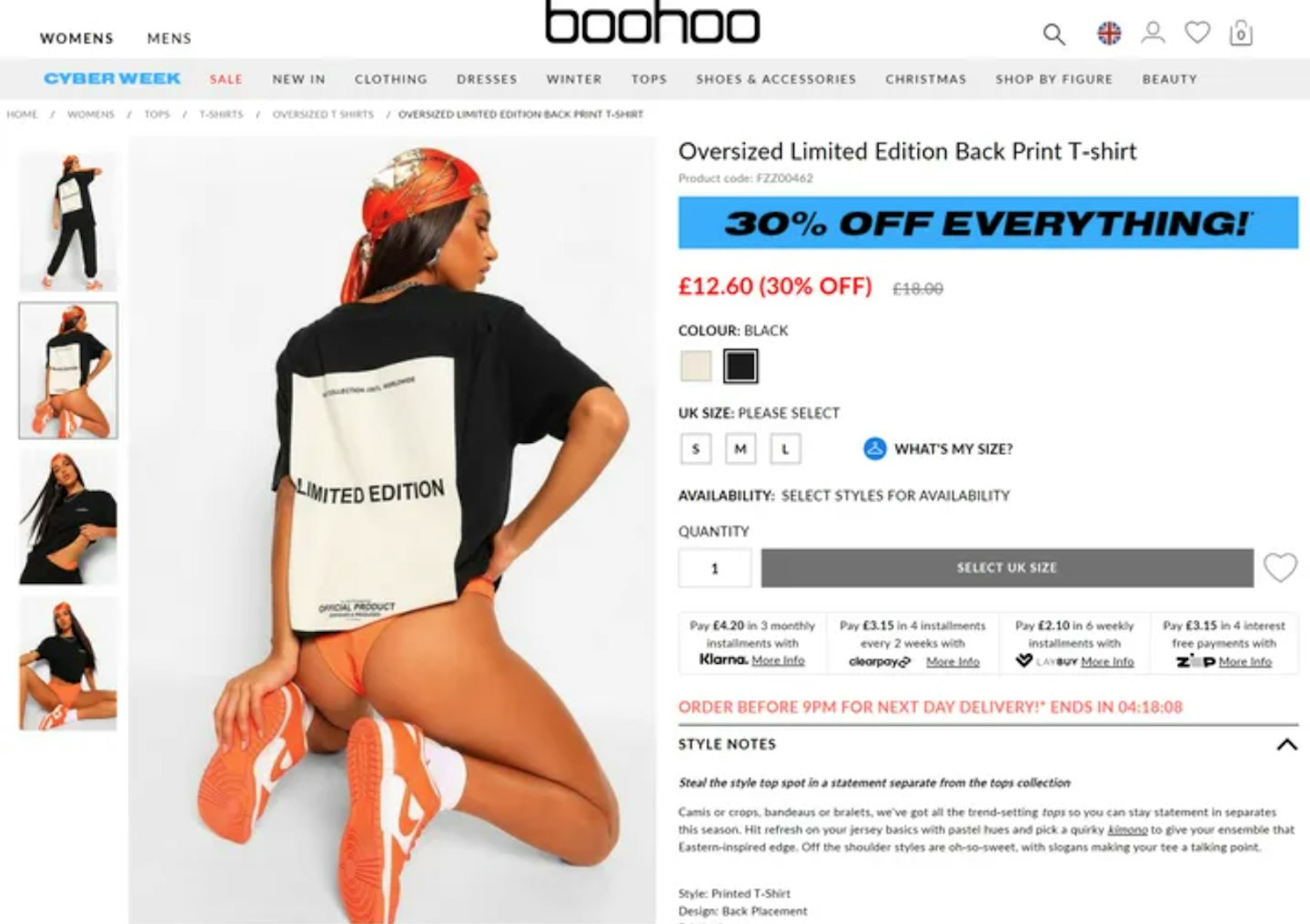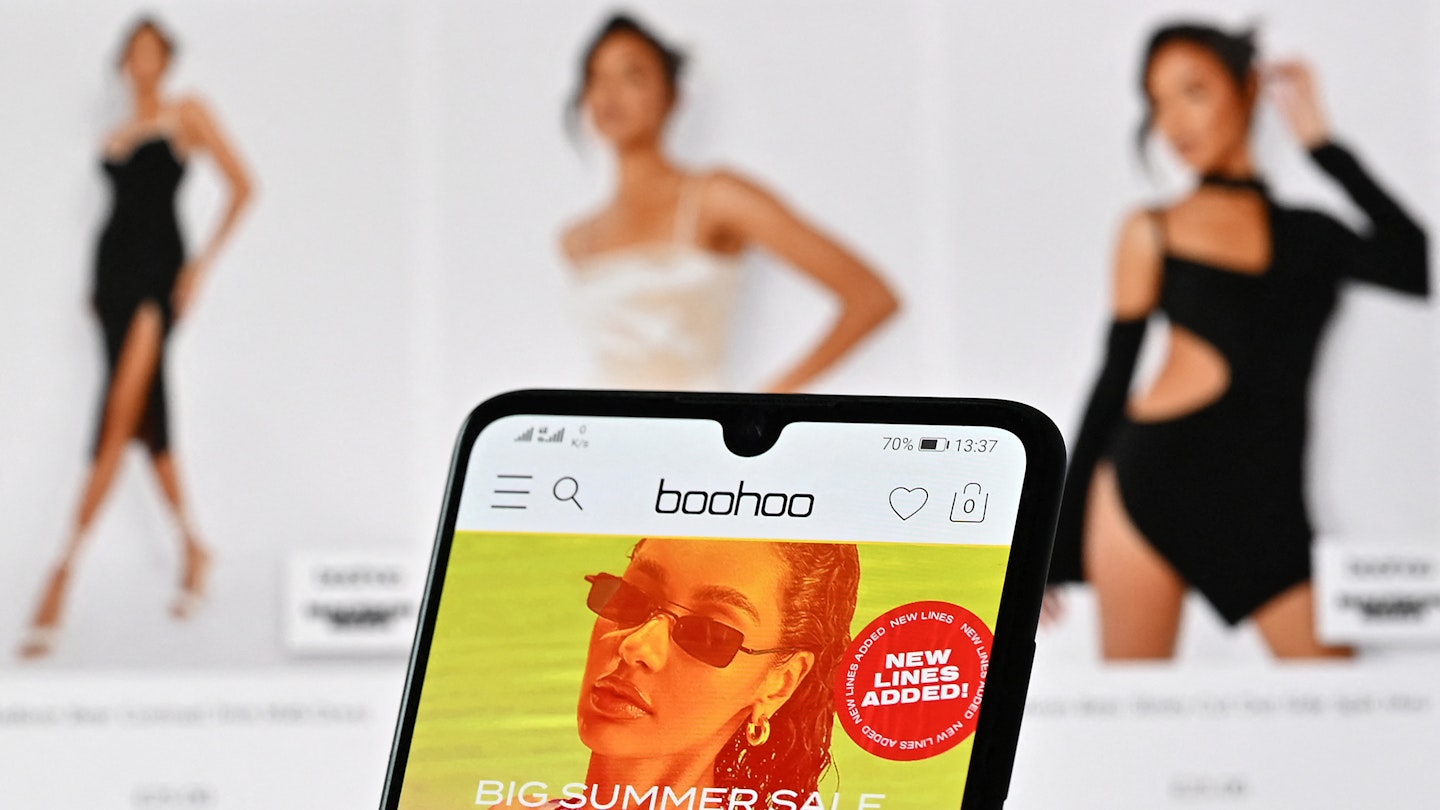A Boohoo advert has been banned by the Advertising Standards Authority (ASA) after a complaint that the images ‘objectified women’. The ‘sexually suggestive’ pictures showed a model sat on her knees in a Boohoo T-shirt, a pair of orange bikini bottoms and matching Nike dunk trainers.
The ASA said of the banned advert: ‘In one of the images, the model was shown from the rear in a kneeling position. We noted that the T-shirt was folded under so that the bikini bottoms and the model’s buttocks and naked legs were visible and prominent.’
The investigation was launched after someone filed a complaint that the Boohoo advert ‘objectified and sexualised women’. And in another shot from the series, the model was sat resting her hand on her knee with her legs apart in the swimwear and T-shirt.
According to the Advertising Standards Authority, these Boohoo images are offensive, harmful, irresponsible and ‘likely to cause serious offence’. At first, this might seem unfair. ‘Boohoo often [combines] a variety of products in their images to show how items could be worn in different ways,’ the brand defended.

For the advert images, it’s clear that Boohoo have made an effort to style the oversized T-shirt for two different occasions: once with tracksuit bottoms as loungewear, and once rolled up with a bikini for the beach as many celebrities, from Emily Ratajkowski and Kendall Jenner, have done on their own Instagrams.
If you go onto Boohoo’s competitors’ pages (Pretty Little Thing, Misguided, I Saw It First) you will see numerous other garments, like linen shirts or jersey trousers styled and marketed for the beach, with women’s bodies on show in a similar fashion.
But the distinguishing factor here is framing and positioning. While I Saw It First’s models are looking directly into the camera with their hands on their hips in a T-shirt and bikini bottoms, Boohoo’s is looking down with their bum pointing directly towards the camera as the central focus of the shot. And Boohoo aren’t selling the model—they’re meant to be selling the T-shirt.
While other brands have put their styling of everyday items with swimwear in a specific beach edit, Boohoo’s was placed unexpectedly alongside the top’s main campaign. If you were searching ‘women’s T-shirt’ and the first image that came up was of a woman naked on the bottom half, it’s easy to see why you might feel outrage at the disparity between this and the straightforward way men’s T-shirts are always advertised.
A Boohoo Group spokesman said of the controversy: 'We are disappointed by the findings of this ruling because we pride ourselves in our inclusive, body-positive imagery. Our marketing reflects the vibrant and confident culture of our brand and is not designed to intentionally cause offence.'
As many Twitter users have pointed out, this ASA complaint against Boohoo might not be the hill that watchdog authorities want to die on when there are still numerous accusations of underpaying factory workers lodged against fast fashion brands across the UK that need investigating.
Additionally, if we’re considering how clothes are modelled specifically, there still isn’t an equal representation of body types, stretch-marks or cellulite displayed in clothes marketing when bikinis are appropriate.
That being said, as much as it might sometimes feel like nit-picking to point this stuff out, in order to begin dismantling the overwhelming issue of unwarranted objectification of women in society, we need to first take notice of the micro-misogyny that sustains the larger issue — like modelling a T-shirt with a bikini when it could have been done with jeans.
READ MORE: Cara Delevigne Advert Banned Near Schools For Being Too Sexy
This Tights Advert Showing A Woman's Back Has Been Banned From The Tube
Admit It: You Hated Emily Ratajkowski Because She's Beautiful
